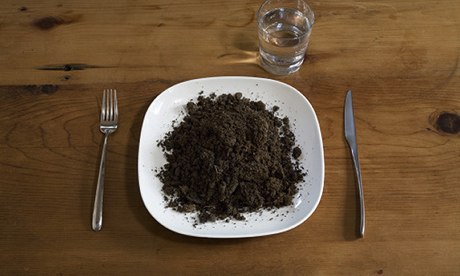
By Nancy Matsumoto
EXCERPTED
Anthony Myint vividly recalls the moment he encountered the idea that would shift his life’s path. In 2014, the San Francisco chef and his wife and business partner, Karen Leibowitz, visited California carbon ranching pioneer John Wick at Nicasio Native Grass Ranch in Marin County.
“He had a bunch of whiteboards out and he was just wrapping up a talk with some U.N. people,” Myint recalls. Wick had been working on the Marin Carbon Project, the now well-known collaboration with U.C. Berkley scientist Wendee Silver that examined whether or not several “carbon farming” practices—such as managed grazing and adding a thin layer of compost to the land—could in fact pull greenhouse gases from the atmosphere.
Wick talked about the difference between durable carbon—deposited and locked into the ground for up to centuries by plant roots and decaying and dead microorganisms—and carbon that routinely circulates from above to below ground. Hearing of the work the couple was doing helping restaurants offset their greenhouse gas emissions, Myint recalls, Wick “told us we weren’t thinking big enough.” Atmospheric carbon wasn’t just something to avoid emitting, or to pay others to scrub from one’s environmental footprint, Myint and Leibowitz now understood: farming itself could regenerate the land.
That day, Myint and Leibowitz joined a much larger movement to bring regenerative agriculture to the mainstream and help farmers, chefs, and eaters understand the value of healthy soil. “We’re in the midst of a massive cultural change in response to global warming, and farming and healthy soil are probably the most practical and biggest solutions we have,” says Myint.
Myint and Leibowitz have spent the last five years figuring out how to help the competitive, thin-margin, high-burnout world of creative chefs, restaurants, and their fickle diners play a role in regenerative agriculture. Their first effort was the nonprofit Zero Foodprint, which helped restaurants offset their greenhouse gas emissions. Their recently shuttered restaurant, The Perennial, sought to serve food produced regeneratively and educate consumers about the role food plays in absorbing carbon.
“We assumed people would be excited about optimistic solutions, and would line up for the Tesla of food,” says Myint. But the public wasn’t ready. They learned that “we couldn’t rely on one consumer, one chef at a time to create system change.” They needed, as Wick encouraged them, to think bigger.
Now, under their nonprofit The Perennial Farming Initiative (PFI), Myint and Leibowitz have started laying the groundwork for a program, Restore California. Participating restaurants add an optional “1 percent for healthy soil” surcharge to customer tabs. PFI has already signed 30 restaurants up for the Restore California surcharge; if 1 percent of the state’s restaurants follow suit, the group estimates it could generate $10 million per year in funding for healthy soils.
The project is a collaboration between the California Air Resources Board (CARB), the California Department of Food and Agriculture, and PFI; when it is fully up and running, proceeds will go directly to farms and ranches working to improve soil health as a complement to the state’s Healthy Soils Program.


